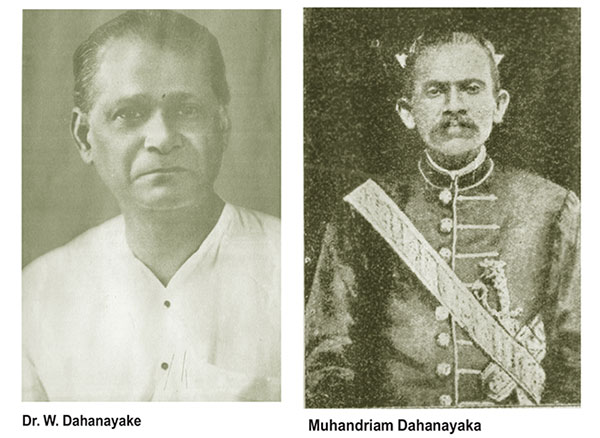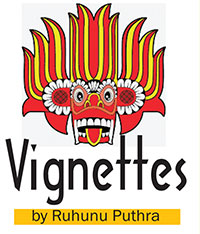The heavenly twins of Galle
Posted on November 20th, 2021
Courtesy The Island

The 22nd of October 1902, was a busy day for Muhandiram Dionysius Sepala Panditha Dahanayake. The Dayaka Sabha of the Wijayananda Viharaya at Weliwatta, Galle, of which the Muhandiram was the Pesident, was holding a special pooja. Suddenly in the middle of the ceremonies, Muhandriam Dahanayaka got an urgent message from his home. His face wreathed in smiles, the Muhandiram hurried to his walauwwa. Yes! He had just become the father of twin boys.

He named the elder of them Wijayananda after the Wijayananda Viharaya. As the happy news was heard when performing a meritorious act while in convivial company, the other twin was named Kalyanapriya.
Of historical interest;
(I) It was at this Viharaya that Colonel Henry Steele Olcott and Madame Blavatsky observed Pansil” for the first time and embraced Buddhism, on the 19th of May 1880.
(ii) the Sunday Dhamma School in this Viharaya is the oldest in Sri Lanka. It was started in 1895.
For the first time in Sri Lanka, Jayamangala Gathas were recited at a wedding, by a bevy of girls from this sunday school in 1897.
(iii) The Ramanya Nikaya (Sect) originated at this temple in 1864, under Ven. Ambagahawatte Indra Sabhowara Gnanasami.
(iv) A relic of the three relcs of Buddha, gifted to Sri Lanka from the kapilawastupura relic discovery and offered to the Ramanaya sect, is enshrined at this temple.
A personal note:
Weliwatta is the native village of Ruhunu Puthra. He personally knew the Nayaka Theros Ven. Mawelle Sri Dharmarama Ariyakeerthi (Alinkiththe Hamuduruwo) and Ven. Galle Gnanabasha, of this temple.
The mother of W and K, Caroline Dahanayake lulled the twins. They cried together, fell ill together, felt the pangs of hunger and the other wants together.
There were no pre-schools at the time. So, their father sent them to the Rippon Girls School, which was close to their home, with a domestic aide. They both were playful mischievous boys. Before the last bell for the day at school, they would scoot down the hill. One day at a function at this girls’ school, W then a Cabinet Minister said amidst loud laughter, that He and his twin brother were old girls of the school”.
Although they attended the Sunday school at the Galketiya Temple close to their home, they hardly learnt any dhamma from it, not due to any lapse of the school but due to their misbehavior and playing truant.
Thereafter they both attended Richmond College, which was also close to their home. They studied together and also played together and it was a difficult task to identify them when they were together, as they were identical twins.
While in the 5th standard they were given a double promotion. At the Cambridge Junior Examination held in 1917, K beat W obtaining an upper 2nd class o W’s 3rd class pass. Their names appear in the distinguished students’ name board in the college hall.
In 1927, when Mahatma Gandhi visited Galle, they both went to greet him. W also presented him an English poem written by him about Gandhi.
After the death of Baanu Ransi, one of their elder brothers, who was a law student, their elders suggested that they become lawyers as they both were endowed with the gift of the gab.
We don’t want to be barefaced liers” they chorused spontaneously.
To hell with both of you then! And have your own way”, the elders told them with a feeling of disgust.
After they passed the Cambridge Junior Exam at Richmond, they both were sent to S. Thomas’ College, Mount. Lavinia.
They concentrated mainly on studies, lest other extra activities would interfere with their studies. However K was in the college debating team. They were both fond of seeing dramas.
Eventually, the duo entered the Training College at Thurstan Road in Colombo. The vice-principal G.A. Hard who had heard of their barefaced liar story” called them the heavenly twins”. The trainees were given small rooms. Though living in them was not comfortable, what was uppermost in their minds was to study.
Their meals were served at the dining hall. Sinhala food (rice and curry) was served and nobody complained about them. One day the Warden found fault with W and K for using their fingers instead of fork and spoon, to partake of murunga (drum sticks).
The following day, they were hauled up before the authorities who warned them not to do so in the future. They both protested and said that eating with the fingers was in keeping with the Sinhala custom, adding that even Maha Mudliyar Bandaranaike ate murunga with using fingers.
Another day when murunga curry was served again, they started eating with their fingers keeping away the folk and the spoon, when the trainee leader asked them not to do so, as, it contravened the rules of conduct. Both of them then left the dining table in protest.
The following day, Principal A. F. Harrison asked them to leave the boarding house forthwith. However, he magnanimously gestured to pay their food and lodging scholarship allowance. Also, he saw to it that they were not discriminated against.
One day W and K were seated in the garden of the Training College, when W wrote this poem. He stoops to conquer.”
The poem was on the famous romance of Prince Saliya, son of warrior- King Dutugemunu. and the Chandala girl, the beautiful Asokamala; a romance that shook the Royal Court and the entire country and has been told and re-told, sung and re-sung down the centuries.
In palm- thatched hut, alone she sat
And breathed the jasmine – scented air,
Whilst woodland bird so blithely chirped
To greet this maiden wonderous fair,
An outcast born, unloved, unknown, What passing phantom greets, her sight: ‘Tis stately Sal, King Gemunu’s sort: Her bosom heaved with mad delight, Whilst Sal, with magic dreams a -lit, Beheld this sprite of Heavenly beauty, No darksome rift his thought did sift, For lingering love had conquered duty! This pangs lingering love was far above,
The harrowing pangs of princely pride; By the Gods he swore. I thee. adore!” And lost a kingdom fora bride!”
The poem was on the famous romance of Prince Saliya, son of warrior- King Dutugemunu. and the Chandala girl, the beautiful Asokamala; a romance that shook the Royal Court and the entire country and has been told and re-told, sung and re-sung down the centuries.
In palm- thatched hut, alone she sat
And breathed the jasmine – scented air,
Whilst woodland bird so blithely chirped
To greet this maiden wonderous fair,
An outcast born, unloved, unknown,
What passing phantom greets, her sight:
‘Tis stately Sal, King Gemunu’s son-
Her bosom heaved with mad delight,
Whilst Sal, with magic dreams a -lit,
Beheld this sprite of Heavenly beauty,
No darksome rift his thought did sift,
For lingering love had conquered duty!
This lingering love was far above,
The harrowing pangs of princely pride;
By the Gods he swore. I thee adore!”
And lost a kingdom for a bride!”
It appeared in the Training College magazine.
At the final exam held after 2 years, K came first among the trainees with W the second.
Once when one Dahanayake was teaching the children in a classroom at St. Aloysius College, Galle another Dahanayake was on the C.W.W. Kannangara’s election stage. Actually, the one on the stage was W who should have been in the classroom a the time. But it was K who was there.
To be Continued